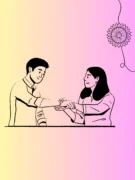Stepping into the world of blogging feels like embarking on a new adventure, a path uncharted yet full of possibilities. As someone who has penned articles and essays before, I find myself in a reflective mood, contemplating the unique nature of blogging. This very first attempt at crafting a blog post is a blend of excitement and uncertainty, a fusion of courage and vulnerability. I hope I am able to do justice to my random thoughts through this blog.
Childhood is a realm of innocence where curiosity often outpaces comprehension. Rakhi, a festival where sisters tie threads around the wrists of their brothers, used to puzzle my young mind. The notion of my brother protecting me in exchange for this simple act seemed a bit unfair. Yet, in the midst of these thoughts, I was engulfed by another thread of family customs and traditions. From my grandparents sending and receiving rakhis to my parents' participation, I found myself inseparably woven into this cultural fabric.
In our joint family's heart, Rakhi was a grand affair. I have fond memories of my dadi's home, especially the lobby where a mat would be spread out. After my bua tied rakhi to my papa and chachu, it was our turn. I, along with my six cousins, would gather on that mat. The sisters would then tie rakhis around the wrists of brothers, continuing the tradition. Laughter echoed through the air, and the sweet aroma of shared kheer added to the feeling of togetherness. And then came the breakfast – a delightful spread of either Chhole puri or Bread Rolls or Aloo Puri, and ofcourse how can I forget aloo k paranthe, a true reflection of our Punjabi heritage.
Just like life's melodies, the tune of Rakhi gradually shifted. My cousins, practically my brothers, ventured beyond our hometown for studies and jobs, leaving me in a quiet and reflective state. It was that one year where I had no one to tie rakhi to and surrounded by memories and rakhi threads, I began thinking deeply about this tradition. Why hadn't I fully embraced it? Why had I questioned its meaning? With their absence, the significance of the festival grew, sparking a quiet change within me.
At times, it's in moments of separation that we truly grasp the importance of the times we've shared. As I tied rakhis to wrists that weren't physically present and revisited the moments of laughter we'd shared, the true essence of Rakhi began to reveal itself. It wasn't solely about the idea of protection; it went much deeper. Rakhi symbolized the emotional shield that siblings offer one another. It was about holding dear those connections that remain strong despite distances and the passage of time. I found myself immersed in a sea of gratitude for the memories we'd created, the companionship we'd enjoyed, and the unspoken pledges concealed within those threads.
Years have slipped away, and we've all grown up. The concept of brothers protecting sisters through that rakhi still puzzles me. Yet, what stays true is that there are only two special days that celebrate the connection between a brother and a sister, the other one being Bhai Dooj. The festival that used to confuse me started revealing its wisdom over time. For me, Rakhi is a special way of celebrating the invisible bonds that tie us together, the way relationships endure, and how families stand strong. As I journey through life, I carry with me the lessons of Rakhi – love, protection, and the unbreakable ties that shape the fabric of our lives.

Comments